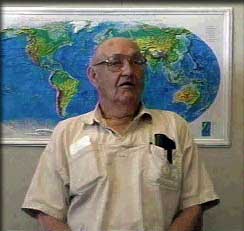
Send your messages to webmaster@rims.k12.ca.us
![]() Sound files on this website are in QuickTime format and require the QuickTime 3 (or newer) browser plugin or player. If you don't have these, visit the QuickTime website to download.
Sound files on this website are in QuickTime format and require the QuickTime 3 (or newer) browser plugin or player. If you don't have these, visit the QuickTime website to download.
Below is a transcript of the fourth part of our interview with Mr. James Allen. Questions are in italics. Links to the sound files are in QuickTime format (see the righthand column for more information). Our sound files are provided in two versions, "Good" or "Better." The former is a faster download, but of lower quality than the latter.
Describe the change in conditions that occurred during the last year of the war. Were you taken to Japan? What happened as the war progressed towards the end?
Well, as the years went by, they got a little better. I lay that to one thing. Many of the prisoners, I don't know what they'd think about it: they don't all have the same ideas about what went on, and the causes and why for's. But being raised in the Midwest and all, why, the old farmers -- one thing and another -- there was always a saying I remember, was "When you're in Rome, you do as the Romans." And that was one of the things a lot of the fellows had a hard time doing. But as you got to know their [the Japanese] customs -- like bowing? -- at first, my goodness, that was terrible. Because the people in America, to bow, that -- we didn't think much of that. And of course, most of those people out there was "boomers" anyway, in construction. And they was pretty tough cookies, and of course, the Marines, what they went through with boot camp, one thing or another, they wasn't about to change. But eventually, the Japanese kind of changed them anyway. But the bowing -- when you found out what it was all about -- that's purely a handshake in this country. Once you understand that, why, it wasn't so bad. And I'll say one thing for the Japanese: I never had one that I bowed to, did not bow back to me, regardless of his rank or race.
 Were you taken to Japan at the end of the war?
Were you taken to Japan at the end of the war?
We went on our way to Japan in April of 1945. We moved from Woosung to Kiangwan, China, closer to Shanghai, in December 1942. And then in the spring of 1945 is when we started moving by freight train, boxcar. We started out in Shanghai and went up to Fengtai, which is a suburb of "Beijing," as they call it today. [Laughs.] We were there only a short time, and then we got back on the freight train -- boxcar ride -- that was a four-day ride, and I forget how long the next ride was, but we went up to Makton, Manchuria -- all the way up to the peninsula of Korea, or "Chosen" as the Japanese called it, to Fusan. There we stayed a couple of days, loaded salt on a ship, then we got on the ferry and went over to Susa, Japan, which is on the southwest part of the main island of Honshu. We stayed there overnight in a schoolhouse, slept on the floor. Then we got on a passenger train the next morning and went up to [Shimonoseki], Japan, which is around the southern tip of Honshu. There we all got off the train and there's where we all split up: civilians, Marines, and what have you. I found out later the Marines went up to the main island, the big island of [Hokkaido], north of the island of Honshu, in a coal mine. There was 150 of us civilians on a passenger train, and we ended up in Niigata, Japan. So they got all scattered out; where the rest of them went, I don't know. But we rode on the train, went to Osaka, Kobe, Nagoya, and that town [Nagano] they had the Olympics in here -- Winter Olympics here recently? We went through that town, up to Niigata, which is on the west coast of Honshu. We was two days and two nights on the passenger train on that. We seen Osaka burnt up, far as you could see from the train, there was nothing standing, only chimneys or masonry walls. There was no buildings, other than the depot -- now how they saved the depot, I don't know. Same way in Hiroshima, and then Kobe, and Nagoya, just burned up. Like you'd get on the train here, the Metro Link here? go to Los Angeles? -- see nothing. Everything burnt, just far as you can see.